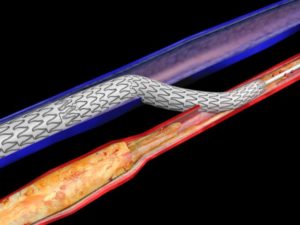
Enrollment has been completed in the PROMISE II pivotal trial of the LimFlow deep vein arterialization system designed to prevent amputations in so-called “no-option” chronic limb-threatening ischemia (CLTI) patients, the eponymous device maker announced today.
“The PROMISE II investigators are very encouraged by our experience using the LimFlow system to treat CLTI patients with no other options. These are likely the sickest patients ever to have been enrolled in a limb salvage trial,” said Daniel Clair, MD, PROMISE II principal investigator, and professor and chair of the department of vascular surgery at Vanderbilt University Medical Center Section of Surgical Sciences in Nashville, Tennessee. “Major amputations have a devastating effect on the lives of patients and their families. We are excited about the prospect of helping improve the lives of more of these patients once this novel technology becomes broadly available.”
PROMISE II is a multicenter, prospective, single-arm study being conducted at sites in the U.S. of 105 no-option CLTI patients. Endpoints include amputation-free survival at six months, limb salvage and wound healing, with subjects followed out to three years. The no-option patients treated in PROMISE II were determined by an independent physician committee to be no longer eligible for conventional endovascular or surgical therapy to treat CLTI, according to LimFlow.
The company also announced completion of enrollment in the CLariTI study of approximately 200 high-risk and no-option CLTI patients. The prospective, observational, multicenter CLariTI study will track the clinical progression of CLTI and incidence of death, amputation, and revascularization attempts in patients undergoing standard medical management for the disease over a one-year period.
“Despite suffering from the most advanced form of CLTI, these no-option and high risk patients have been excluded from other trials,” said Anahita Dua, MD, CLariTI principal investigator and assistant professor of surgery at Harvard Medical School in Boston. “Our hope is that the CLariTI study gives us better insights into the reintervention, amputation and death rates in no-option and high-risk patients treated with the current standard of care.”









